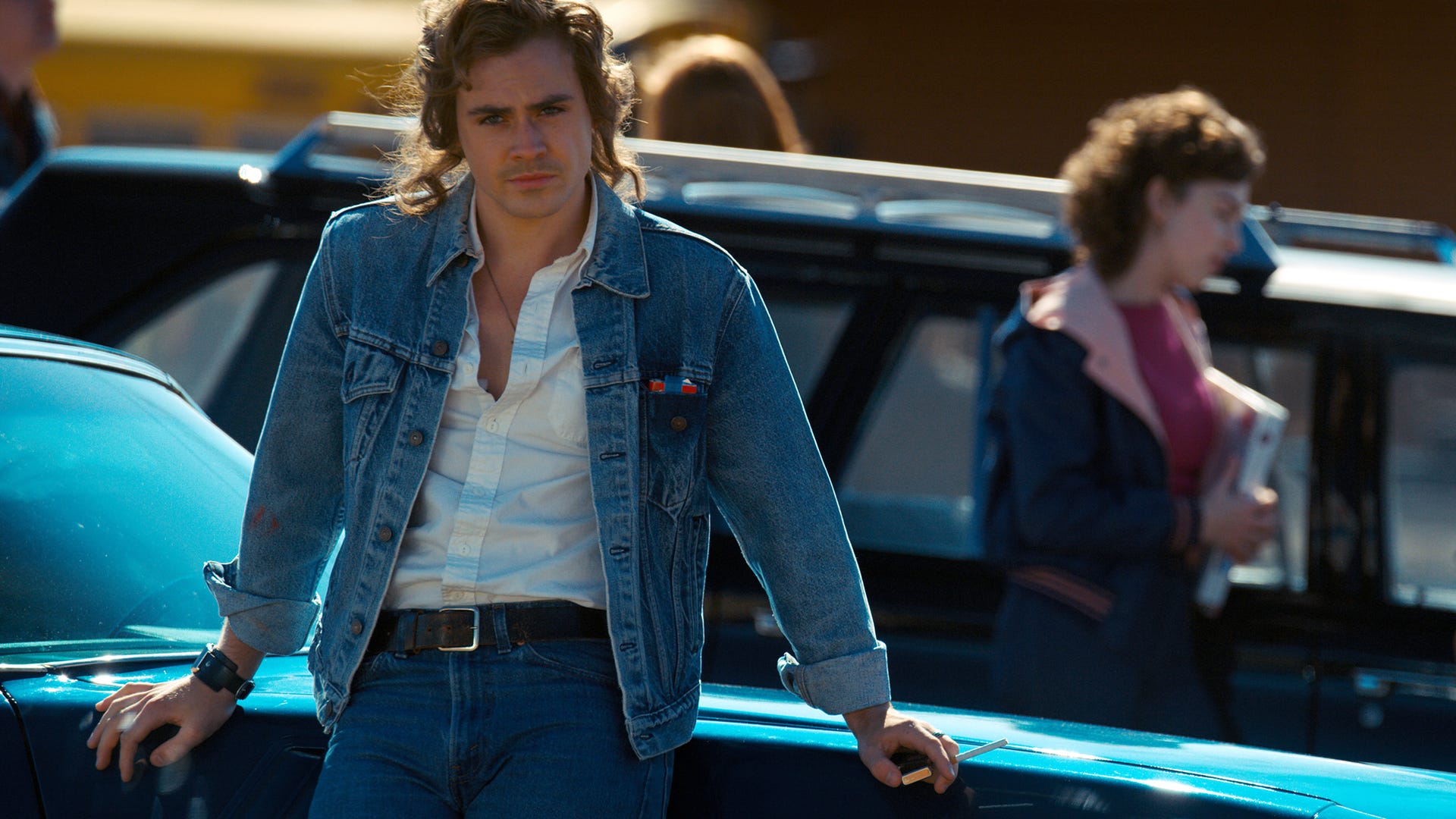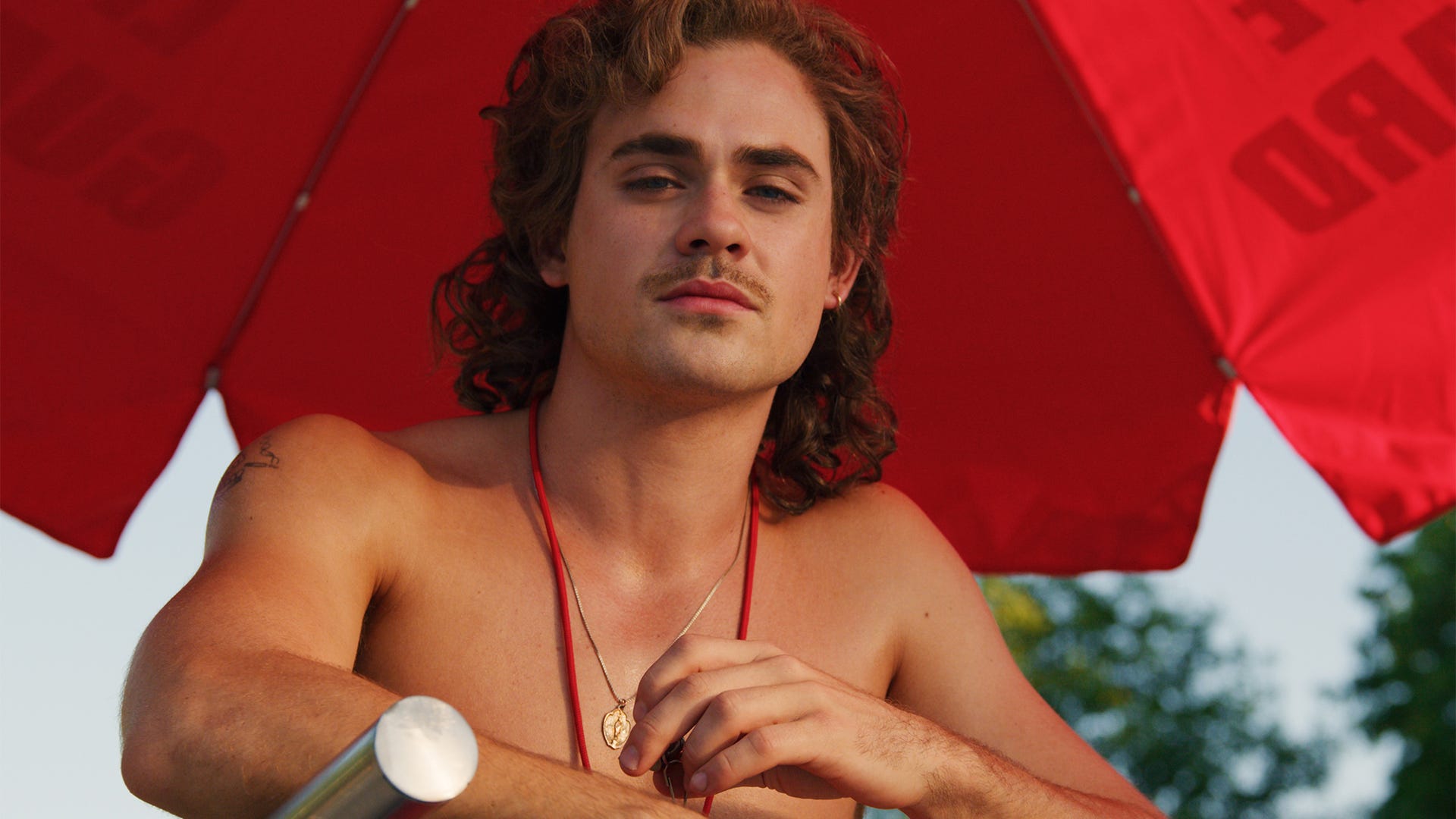Join or Sign In
Sign in to customize your TV listings
By joining TV Guide, you agree to our Terms of Use and acknowledge the data practices in our Privacy Policy.
Stranger Things Is Still Great at Redeeming Douchebags
Steve Harrington, you've got company
[Warning: The following contains spoilers for Stranger Things 3. Read at your own risk!]
You see them (to quote John Hughes) as you want to see them: in the simplest terms, in the most convenient definitions. But what we've found out over three seasons of trips to the Upside Down is that each of us is a Stranger Things Douchebag. The Netflix drama might take its cues from classic '80s films, but when it comes to popular jocks and bad-boy outcasts, Stranger Things isn't content with the decade's superficial Cool Guy stereotypes. The show has revealed a real knack for redeeming its bullies -- and never in the same way twice.
The gold standard of Stranger Things' redemption arcs is still Steve Harrington (Joe Keery), who was introduced in Season 1 as a popular party-boy jock romancing Nancy Wheeler (Natalia Dyer). The Steve of Season 1 was occasionally a jerk: He broke Jonathan's (Charlie Heaton) camera -- for taking voyeuristic pictures of Steve and Nancy, which, to be fair to Steve, is also not OK -- and later goaded Jonathan into a fight, capping it off with homophobic insults: "I always took you for a queer, but I guess you're just a little screw-up like your father." Steve could be cruel. But he was never one-dimensional; the class clown had a surprisingly earnest streak, especially with Nancy. When his "friend" shamed her with a spray-painted message calling her a slut, he took the blame, cleaned it up, and tried to make it right. Stranger Things always saw potential in Steve. He just had to scrub some people out of his life to become the charming, charismatic dumbass he was meant to be.
Stranger Things 3 Is Proof Popular Shows Can Also Be Very, Very Good
The second season, which promoted him to Babysitter of the Year as he looked out for Hawkins' most reckless kids, is remembered as the year everyone fell in love with Steve Harrington, but the Season 1 finale got the ball rolling. Steve leveled up when he showed up at the Byers' place to apologize to Jonathan and got pulled into a fight with the Demogorgon. In 10 minutes, he went from assuming that the biggest threat to his existence was a Farrah Fawcett hairspray shortage to battling a monster from another realm. The most satisfying moment of Stranger Things' first season was the sound of a bat covered in nails spinning through the air as Steve Harrington used his jock powers for good, attacking the Demogorgon with style.

Joe Keery and Gaten Matarazzo, Stranger Things
NetflixThat same protective instinct is what makes him such an unexpectedly great friend to the kids who get caught up in Hawkins' conspiracies, especially Dustin (Gaten Matarazzo). Not to downplay his growth (in a nice counterpoint to his Season 1 bullying, he develops a sweet friendship in Season 3 with Maya Hawke's Robin, a former classmate who turns out to be a lesbian), but part of the genius of the character is how much the show suggests that he was always this person, deep down; his worst traits were just products of a desperate desire to fit in with the wrong crowd. Steve admits in Season 3 that popularity never made him happy: "It just baffles me. Everything that people tell you is important, everything that people say you should care about, it's all just bullsh--."
Let the Kids Time Travel in Season 4 of Stranger Things
It must have been nice for Steve, then, to basically get to fight the person he used to be -- the Cool Guy incarnate -- in the Season 2 finale. Billy Hargrove (Dacre Montgomery), the new bully in town, had no redeeming qualities when he debuted in Stranger Things 2. Styled after Rob Lowe's character in St. Elmo's Fire (also named Billy), he hit the scene as a mullet-rocking, earring-sporting bad boy who lives on the edge, and he spent most of the second season doing nothing to complicate that image. There was a real darkness to Billy, but there wasn't any depth; he was rough with his stepsister Max (Sadie Sink), and he threatened her and her friends, especially Lucas (Caleb McLaughlin), which -- since he'd only seen the boy from a distance -- was hard not to read as racist, despite the actor's insistence that it wasn't meant to be.

Dacre Montgomery, Stranger Things
NetflixMontgomery did what he could to give Billy complexity in Season 2. He made the boy's transgressions more fun by adding a playful spin to his flirtation with Mrs. Wheeler (Cara Buono): As he recalled to Vanity Fair, "I said to the Duffers, 'Boys, let's just be cheeky -- eat a cookie.'" And he encouraged the show's creators to humanize Billy by including a scene with his verbally and physically abusive father, which, in Montgomery's words, helps explain "why he's a dick." The actor told Vanity Fair, "I can't just play bad, because nobody's just bad." It's the right instinct. The revelation that Billy is the product of an abusive household adds a tragic note to his story -- violence is cyclical -- without turning that explanation into an excuse. Billy is never more terrifying than when he beats up Steve, a confrontation that occurs after the audience learns about Billy's father. His backstory provides a devastating context for his anger, but it doesn't absolve how he expresses that anger.
Billy's arc takes an unexpected turn in Stranger Things 3. While Steve keeps revealing more layers over time, Billy earns sympathy by getting boiled down to the simplest terms: You just don't want him to die. Possessed by the Mind Flayer, Billy becomes, on the surface, even more villainous -- which has the effect of making original-flavor Billy feel almost quaint. (Almost because even if the show might never have intended for him to play as racist, he did, and racism isn't quaint.) The season misses the opportunity to let Billy fight his possession as clearly as Will (Noah Schnapp) did in Season 2, but Montgomery -- who does great work with this story -- finds small ways to make his struggle poignant, often playing scenes with a single tear running down his cheek. At a primal level, he becomes someone to root for: Billy is a victim of the Mind Flayer, and as the old saying goes, the enemy of my interdimensional monster enemy is my friend.
How Hopper May Still Be Alive After Stranger Things' Devastating Finale
The third season also softens Billy by delving more into his painful history with his parents. El (Millie Bobby Brown) enters Billy's mind and winds up in his memories, reliving a sunny day on the beach surfing with his mom, who later left him when she escaped his abusive father -- a loss Billy processed by becoming a bully himself. His memories with his father are overpowering: a chaotic storm of red lightning and sand swirling in the wind. El's Void is usually empty, a realm she accesses through sensory deprivation; this is sensory overload, a powerful simulation of Billy's raging emotions. In the season finale, El accesses those emotions to break the cycle of violence. She reminds a flayed, possessed Billy of a time when he felt loved, and he responds by breaking through his possession and standing up to the Mind Flayer, dying so the kids can live.
It's a classically redemptive death -- sacrificial, pierced through his sides, Christlike. But it's still bittersweet, especially considering that Billy might have lived if Joyce (Winona Ryder) had closed the gate to the Upside Down a little faster instead of gazing into Hopper's (David Harbour) eyes for an extra 30 seconds. It would have been interesting to see what sympathy Billy could have earned as he grappled with the aftermath of his possession. Dying as the hero is easier than living as one. Hopper, the show's grown-up douchebag (whose growth isn't so much a smooth arc as it is a constant roller coaster), knew that. He was always too willing to martyr himself; it was a more comfortable idea, after everything he'd been through, than letting himself be happy. Like Billy, Hopper got his heroic death. But since the show has left itself plenty of ways to bring Hopper back, he might still get the chance to face what it means to live as a better person.
Growing up never stops on Stranger Things, especially for men who have toxic ideas to unlearn. Billy died too soon to get that chance, but the show still pulled off something impressive with him, finding humanity in a character who, for most of the season, was barely human. The series doesn't need to redeem everyone, but so far the redemption stories Stranger Things has chosen to tell have been as varied as its characters: reminders that anyone can change, except maybe Mr. Wheeler.
Stranger Things 3 is now streaming on Netflix.

Dacre Montgomery, Stranger Things 3
Netflix